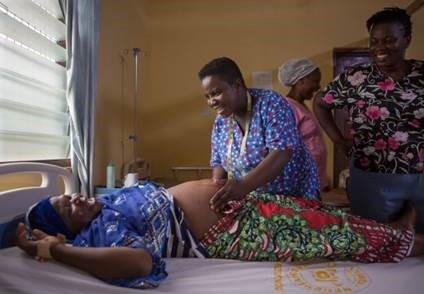Only 1 in 3 women fully protected from preventable yet deadly disease during pregnancy
Geneva, 06 October 2020 - The RBM Partnership to End Malaria has today issued an urgent appeal to leaders and health policymakers across Africa to better protect millions of pregnant women and their newborn children from the devastating consequences caused by malaria in pregnancy.
Malaria strikes hardest against pregnant women and children in sub-Saharan Africa, who are now at even higher risk from the disease due to the COVID-19 pandemic. An estimated 11 million pregnant women in sub-Saharan Africa were infected with malaria in 2018 (29% of pregnancies), resulting in nearly 900,000 children born with a low birthweight, a leading cause of child mortality[1]. Even when death is averted, low birthweight has adverse consequences on children’s growth and cognitive development.[2] Each year, maternal malaria is also responsible for 20% of stillbirths in sub-Saharan Africa.[3]
Despite progress over recent years, in 2018, more than two thirds of eligible women across 36 countries in sub-Saharan Africa did not receive the full course of life-saving preventive treatment against malaria during pregnancy.[4]
Good health starts with proper care of pregnant women and children. Protecting pregnant women, their unborn babies and newborns from malaria will improve the health of mothers and their young children in those critical first years of life and can contribute towards the achievement of Africa’s broad health and development goals,” said Her Excellency, the First Lady of the Republic of Ghana, Rebecca Akuffo-Addo.
While over 90% of lifesaving malaria intervention campaigns – including the distribution of mosquito nets and seasonal malaria chemoprevention campaigns - are on track to be completed as scheduled, malaria cases and mortality are expected to rise this year. As the COVID-19 pandemic takes its toll, millions of people, particularly pregnant women and young children, remain vulnerable to malaria because access to routine health services - such as antenatal care and malaria diagnosis and treatment is at risk of disruption as a result of COVID-19.
In response, the RBM Partnership has launched its ‘Speed Up Scale Up’ call to action, which aims to increase coverage of intermittent preventive treatment in pregnancy (IPTp) with at least three doses of a quality-assured antimalarial (sulfadoxine-pyrimethamine, or SP) to all eligible women in sub-Saharan Africa by 2025.
Governments and health officials are also urged to sustain efforts to prevent, detect, and treat malaria among pregnant women and other populations at risk, so that the response to the COVID-19 pandemic does not undermine the provision of life-saving services.[5]
“In the context of COVID-19 pandemic, it is essential that other deadly diseases such as malaria are not overlooked, or deaths will increase dramatically. Intermittent preventive therapy for pregnancy is simple and cost-effective; it saves newborn lives and prevents adverse outcomes on child development. IPTp-SP needs to be expanded substantially in all countries where it is a recommended intervention,” said Dr. Aminata Cisse ep. Traore, Deputy Director of Reproductive Health, Directorate-General of Health and Public Hygiene, Ministry of Health and Public Hygiene, Mali.
Alongside the use of insecticide-treated mosquito nets, IPTp-SP is a simple and highly cost-effective intervention recommended by the World Health Organization (WHO), which is delivered to pregnant women in Africa during antenatal care to reduce maternal anemia and the risk of low birthweight.
- Ends -
Notes for the Editors
Background:
Pregnancy reduces a woman’s immunity to malaria, making her more susceptible to infection and at greater risk of illness, severe anaemia and death. Maternal malaria also interferes with the growth of the fetus, increasing the risk of premature delivery and low birth weight – a leading cause of child mortality (Source: WHO).
In 2015, the RBM Partnership issued a Global Call to Action to increase coverage with IPTp. The five years that followed brought steady progress. As of 2016, 36 African countries had adopted a policy of providing the minimally required three doses of IPTp to pregnant women.
Since 2017, projects have been ongoing to evaluate the effectiveness of community-level distribution of IPTp with quality-assured SP in Burkina Faso, the Democratic Republic of the Congo, Madagascar, Malawi, Mozambique, and Nigeria. Since 2018, to increase the quality of global supplies of SP for IPTp, three African manufacturers are supported to produce quality-assured SP packaged specifically for IPTp.
The ‘Speed Up Scale Up’ call to action aims to rally global communities to bring this lifesaving intervention to all eligible women, by:
- Ensuring uninterrupted access to antenatal care (ANC) for pregnant women
- Maintaining malaria in pregnancy service delivery as a core component of ANC during the COVID-19 pandemic, adapting processes where required to allow for social distancing and infection prevention and control measures
- Securing adequate funding
- Facilitating greater collaboration and partnership between national malaria and reproductive health programs.
For more information, press only:
For any press enquiries or to arrange an interview, please contact the RBM Partnership press office at Grayling at RBMPartnership@grayling.com.
The following spokespeople are available for further comment:
- Julie Gutman, pediatric infectious disease specialist and medical epidemiologist in at the Centers for Disease Control and Prevention
- Maurice Bucagu, Medical Officer, Maternal Health Services, World Health Organization (WHO)
For more information on the Global Call to Action: https://endmalaria.org/
To download the social media kit: https://endmalaria.org/
For more information on Malaria in Pregnancy: https://endmalaria.org/our-work-working-groups/malaria-pregnancy
For more information on the RBM Partnership to End Malaria: https://endmalaria.org/
This Global Call to Action was shaped by the Centers for Disease Control and Prevention, Jhpiego, The London School of Hygiene and Tropical Medicine, Malaria Consortium, Medicines for Malaria Venture, SpeakUpAfrica, the U.S. President’s Malaria Initiative, the World Health Organization, the Impact Malaria Project and The Global Fund.
[1] World Health Organization. World Malaria Report 2019.
[2] World Health Organization. World Malaria Report 2019.
[3] World Health Organization. World Malaria Report 2019.
[4] Ibid.
